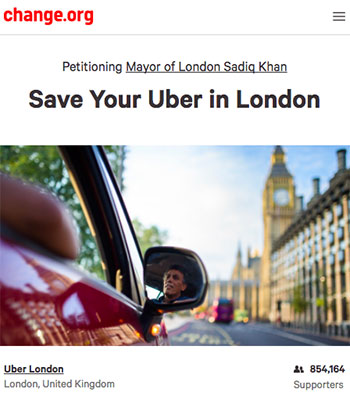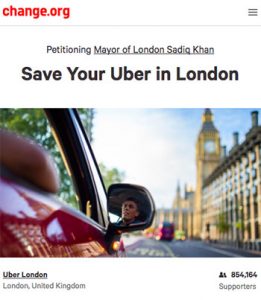
Uber and the corporate capture of e-petitions
Steve Andrews looks at a profit-making petition platform’s questionable relationship with the cab company.
This blog post was originally published by Red Pepper in October, 2017. Re-posted by kind permission.
‘As an open platform, anyone can use our platform no matter who they are, where they live, and what they believe… This is why you’ll see an extremely wide range of petitions, as they’ve all been created by people in the community.’ Ben Rattray, founder and CEO of Change.org
Uber’s huge online petition, hosted by Change.org, protested the removal of its London licence for refusal to comply with safety concerns. At first glance, the petition looked like an emphatic show of support by citizens for a cab company popular for its low fares. Yet the e-petition raises serious questions about contemporary civil society, transparency and corporate power.
Uber’s petition demonstrates how large companies can manipulate democracy through contemporary modes of political participation – and also reveals some uncomfortable contradictions in the business model of the petition platform Change.org.
Uber’s lobbying strategy
It’s first worth putting Uber’s ‘mass’ and ‘viral’ online mobilisation in context. Uber faces significant challenges in convincing people and politicians that the problems caused by the platform are worth the cheap fares and precarious jobs.
The controversy is not just about Transport for London’s concerns over safety. Problems also include the welfare of drivers without rights to sick, holiday or parental pay, and their vulnerability to being removed from the platform or pay reduced without any accountability or consultation. The long-term sustainability of the platform itself, which runs at a significant loss, is also under question – this too puts drivers’ pay and continued employment at risk.
In response to these challenges, the company has developed a wider political strategy that has given the firm a reputation for ignoring, defying or co-opting elected politicians the world over. After a ban in Germany, Uber simply carried on operating until the ban was lifted. The firm spends vast amounts of money on lobbying politicians behind closed doors.
 Their use of online petitions on platforms marketed as progressive is just an extension of this extensive PR and lobbying work, and it appears to be part of Uber’s standard strategy for pushing back against regulation. The company initiates petitions on its own behalf, for its own interests, either hosted on its own website or on Change.org. We found examples in numerous North American cities and states (e.g. Dallas, Seattle, Houston, Baltimore, Chicago, San Antonio, Calgary, Pennsylvania, Portland) as well as many other countries (Denmark, Spain, India).
Their use of online petitions on platforms marketed as progressive is just an extension of this extensive PR and lobbying work, and it appears to be part of Uber’s standard strategy for pushing back against regulation. The company initiates petitions on its own behalf, for its own interests, either hosted on its own website or on Change.org. We found examples in numerous North American cities and states (e.g. Dallas, Seattle, Houston, Baltimore, Chicago, San Antonio, Calgary, Pennsylvania, Portland) as well as many other countries (Denmark, Spain, India).
It also promotes these petitions aggressively, through its access to user data, drivers and mass marketing. Uber customers are mass emailed asking them to sign the petition, Uber drivers have been instructed to sign petitions with emails and splash screens, and app users receive notifications. Uber even promote their petitions using Google advertising space (we found these by accident when searching for information about Uber). Far from being a spontaneous ‘viral’ exercise, mass marketed and widely promoted petitions are part of a wider strategy to maintain market position.
Petitioning for profit
The corporate use of petitions already contradicts a basic premise of grassroots organising. Petitions have a long history as a mode of participation allowing ordinary people with a grievance to collectively address political actors and hold them accountable: particularly important for those without other recourse to political action. The Chartists petitioned parliament to demand the right to vote, while the petition to free Nelson Mandela from political imprisonment allowed international civil society to address South Africa’s apartheid regime.
The internet has revolutionised petitions, lowering the costs for producing and administering them, which has led to a host of mainly non-profits (eg. 38 Degrees, SumOfUs and Avaaz) as well as public platforms (such as the UK parliament’s own petition website), and a rise in the use of petitions as a mode of participation easy to engage with and cheap to administrate.
Change.org, however, also allows huge corporations a platform on the site, giving them the opportunity to orchestrate civil society methods to advance their agenda alongside the usual campaigns started by ordinary citizens. And the idea of the petition as a democratic, bottom-up tool for demanding social change is further thrown into question by Change.org’s other practices, which suit Uber’s aggressive political strategy rather well.
Unusually for a petitions website, Change.org Inc is a for-profit company rather than a charity and, following a controversial change of direction in 2012 after hosting a union-busting organisation’s petition, it became the only petitions site to stop filtering causes (apart from excluding hate speech), thus opening up the platform to anyone and everyone – including corporations and conservative organisations with a rather different agenda to those of citizens.
Yet it’s the site’s business model that must really appeal to Uber, as despite now refusing direct advertisements, Change.org allows ‘supporters’ (anyone) the opportunity to ‘chip in to help specific campaigns get seen by more people’ (‘promoted petitions’). Like Facebook advertising, promoting a petition means an increase in visibility.
Of course, ‘chipping in’ if you are a company worth $62 billion gives the corporate petition a significant advantage over the rest of us – certainly the traditional petition, where ‘going viral’ depends on the work of citizens and the level of commitment of its adherents. A lack of transparency on the part of Change.org means we can’t know just how much Uber, or any other company that might want to run a petition, has paid. This makes it hard to trust petitions and evaluate their significance.
Might a company that carries out screenings for the NHS have ‘chipped in’ to a petition asking that routine cancer screenings are carried out at a younger age? Might a building company be ‘chipping in’ to a petition on the building of more homes? While these may seem relatively benign scenarios, the point is that the platform model could give added weight to campaigns backed by corporations who happen to share a single goal with an individual – or perhaps more problematically, as could be the case with Uber, it offers them the potential to buy a successful campaign all of their own. Thanks to the opacity of the platform, we’ll never know.
Corporatising democracy
Change.org argues that these features allow a win-win situation. Its commitment to democracy, it suggests, is furthered by its openness to petitions begun by anyone. Oddly, their characterisation of petitions as set up by ‘people in the community’ includes the UK head of Uber, Tom Elvidge, who initiated the London petition.
More insight into Change.org Inc’s vision comes from further statements of its CEO Ben Rattray, in the context of having raised $25 million after a funding round (investors were largely drawn from the tech sector, perhaps drawn to Change.org’s access to rich user data (see their privacy policy). He said: ‘This investment is recognition that there’s an opportunity to democratise democracy in the same way that we’ve democratised everything from media and communications to commerce to, increasingly, transportation… It’s about lowering the barriers to entry in industries that traditionally are difficult to participate in.’
This is quite a novel understanding of democracy. Rattray’s vision of democracy appears to refer to a new company’s right to corporate advantage in an ‘industry that is difficult to participate in’ (ie. regulated), and extends citizenship to corporate actors. In the case of Uber, the ‘democracy’ also comes from the company using its own drivers and customers as proxy voters against regulators in theory answerable to an entire population.
The Uber London ban and petition is part of a shift in the way transportation is organised, one that may not, as the evidence suggests, be sustainable. Yet it seems clear Uber will continue to fight legislation here and all over the world to guarantee its investors a return. There is potential for innovation around ‘sharing’ to use resources and deliver services in a way that is more responsive to our needs and more accountable to workers and consumers – but this isn’t it.
The petition controversy highlights another attempted shift: to radically change the meaning of civil society and the traditional tools of citizen participation by ‘opening them up’, ‘democratising’ them – to businesses. The growth of online civil society platforms can empower people who otherwise don’t have a voice in democracies largely unaccountable to their populations. However, the Uber Change.org petition suggests they can further entrench corporate power, ensuring that here, as elsewhere in contemporary democracies, businesses will enjoy huge advantages over ordinary people.






0 Comments